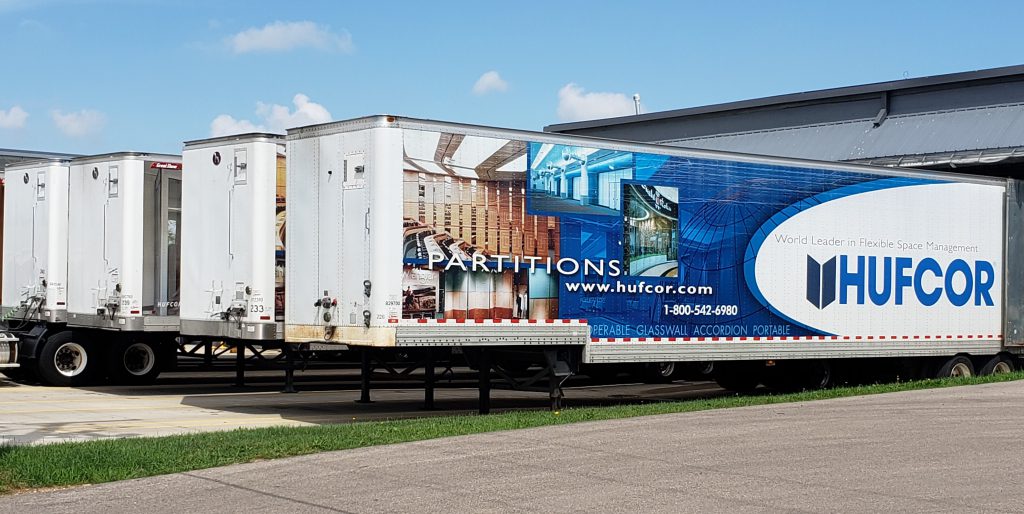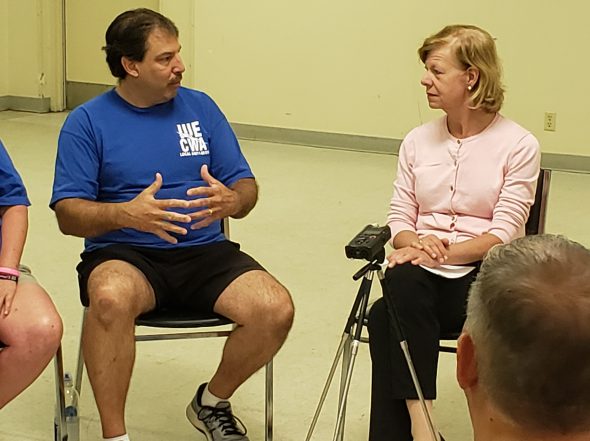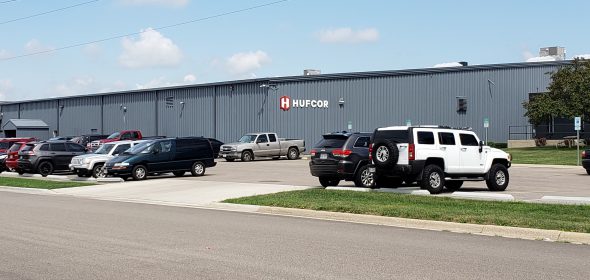Workers In Janesville Feel Left Behind
Private equity firm moving company and all its jobs to Mexico.

Trailers to deliver products from Hufcor are lined up outside the company’s factory in Janesville. Photo by Erik Gunn/Wisconsin Examiner.
When the company where both he and his wife worked was bought up a few years ago, Mike Gackstatter did a little research on the buyer.
The couple both worked at Hufcor, a home-grown Janesville manufacturer of specialty room dividers used in large private and public spaces. The new owner was OpenGate Capital, a Los Angeles private equity firm.
He relayed the story to his wife, Phyllis. “I told her, ‘You know, we can’t both stay here — one of us has to go somewhere,’” Gackstatter recalls. What if the plant were to close? “We wouldn’t have insurance, we wouldn’t have any income in our house. And we’ve got three kids. It would be just devastating for us,”
Mike had more than 30 years in at Hufcor. Phyllis had 22. He had accumulated more vacation time and other benefits. And she had an opportunity for another job, helping with deliveries for a greenhouse business where she was already working part-time
So Mike stayed at Hufcor and Phyllis left for the greenhouse business. That was in 2017. But four years later, just before Memorial Day, that “what-if” scenario came true with a thud.
Management representatives summoned Gackstatter and other union leaders in the plant to what the workers thought was a routine meeting. Then they broke the news: The Janesville factory would close by the end of the summer. The work would move to a new factory in Mexico. About 150 people would lose their jobs.

Mike Gackstatter speaks with Sen. Tammy Baldwin during a round table on Wednesday for workers who face layoff at Hufcor in Janesville. Photo by Erik Gunn/Wisconsin Examiner.
On Wednesday, Gackstatter and other factory workers at the Janesville Hufcor plant spent nearly an hour telling their stories to Sen. Tammy Baldwin (D-Wis.). For Baldwin, the story was a grimly familiar one, illustrating the hazards of unregulated private equity acquisitions across the American industrial landscape.
As she listened and asked questions, Baldwin made a point of stipulating that she was not painting all private equity investment with the same brush.
“But it seems like, too many times, they look at ‘How much money can we suck out of this into our pockets or our investors’ pockets?’ — without any community input,” she said.
Baldwin had already spoken to Hufcor workers earlier in June on a Zoom call from her Washington, D.C., office. On June 16 she sent a letter to OpenGate’s founder and CEO filled with pointed questions about the shutdown plans and urging the firm to reconsider.
She has not yet received a response, she told the Hufcor workers she spoke with Wednesday.
From hometown to out of town
Founded in 1900 as the Hough Shade Corp., the company grew and evolved over the century, becoming Hough Manufacturing Corp. and then, in 1980, changing its name to Hufcor. The company’s primary products are movable room dividers used in schools, churches, hotels, convention centers and office buildings. More than 100 years after its founding, it has operations worldwide in Germany, Malaysia, China and Australia.
The family-owned company maintained a family culture through most of those years, workers recalled Wednesday. And the workers on the factory floor thought of themselves that way, too. “We’re family — we’ve been together for years,” Kathy Pawluk, a 36-year veteran of the plant, told Baldwin.
Hufcor and its workers were involved in the community, said Gackstatter, supporting organizations such as the United Way, the local Boys & Girls Club and the YMCA.
Rick Kinderman, another veteran of 36 years at the plant, saw that culture fade over the last 10 years or so. And when OpenGate acquired the company, the trend accelerated.
“They don’t want any ties to the community,” Gackstatter told Baldwin. “Our head of HR [human resources], our plant managers — all those guys fly in. They’re not from Wisconsin. They have nothing to do with us, they don’t want nothing to do with us.”
Hufcor workers are represented by the industrial division of the Communications Workers of America (CWA). Several of the workers who met with Baldwin Wednesday serve on the union team that is negotiating a severance agreement with the company.
When the plant’s union representatives first learned of the shutdown plans in late May, management officials ordered them not to talk about it. But the news soon got out, and while the company has yet to publicly confirm its plans for a plant in Mexico, workers who were there say that’s what they were told at the meeting.
In response to an inquiry from the Wisconsin Examiner, OpenGate and Hufcor provided a written statement Wednesday evening, delivered by Meredith Bishop of the public relations and marketing consulting firm Prosek Partners.
“As with many businesses around the world, Hufcor is suffering significant negative economic effects related to the COVID-19 pandemic both here in the US, and across its global footprint,” the company stated in its emailed response. “When considering these impacts, and Hufcor’s aging manufacturing facility in Janesville, the future of the entire business is in jeopardy. Therefore, to ensure Hufcor’s survival and long-term viability, the difficult decision was made to relocate manufacturing to an alternate facility while keeping the customer operations teams, and the global research, development and test center in Janesville.”
Teaching their jobs to strangers
Workers said Wednesday that they saw signs as long as a year ago that something was up. People they didn’t know were sent around the factory floor.
“We didn’t know what it was about,” said Sheila Shaw, an assembly worker. “But they asked us to train them. Some guy asked me what I do. I said ‘I just push the button.’ He walked away from me, but I knew what he wanted because he was taking notes.”
They don’t know for certain, but assume that those people were supposed to learn how to do the jobs of the factory workers in order to teach the job to employees elsewhere. But the people who have done that job every day for years and decades think that might not be so easy.
Workers say they’ve also heard that new manufacturing equipment is going into the Mexican plant — equipment that they believe could have been put to good use improving the efficiency of the Janesville plant.
Suspicion lingers. Pawluk says management officials have pushed back on the term “closing” for what’s happening. “They say we’re idling.”
Some workers wonder whether, in a year or two, the company will move the work back to Janesville — and if that happens, they figure the new workforce will be nonunion.
Employees have been told most of them will be let go in early August, but they’ve also been told that some will be asked to stay on until October. Along with severance pay and possible post-layoff health insurance coverage, the union negotiating committee is bargaining with the company over pay incentives for those workers that the company wants to remain through September.
“I don’t trust them, maybe two days before that, to get rid of us,” Kinderman told Baldwin.
Facing the future
With their layoffs looming, the Hufcor workers have welcomed help from government agencies. They’ve been encouraged to apply for federal Trade Adjustment Assistance, which provides some replacement income, job training and other benefits for people who lose jobs when their work moves outside the U.S. Wisconsin Job Service representatives have met with them to get them to help them navigate the process of rebuilding their work lives.
But at times it all seems overwhelming. Sheila Shaw went to work on the assembly line at Hufcor 14 years ago, moved over to the parts-cutting area where workers build panel frames, metal rails and related parts of the folding wall mechanism.
“I’ve been there for 10 years and I tore my body up,” Shaw says. She gestures to her right shoulder: “I’ve had two surgeries here” — and then to her left: “two surgeries here.” She extends each wrist: “I had a surgery here and a surgery here.” A fall left her with a permanent ankle injury, she says. “I just turned 51. I don’t think I could do another factory job.”
Rick Kinderman looks to the prospect of job training with a measure of hope. Local employers are hungering for workers, he observes, with some offering sign-on bonuses of $2,000 or even more.
He expects to find a job while taking classes part-time, perhaps to learn how to do counseling. “I want to do something I could do post-retirement, stay busy and help people — and something that my body will allow,” Kinderman says. “Because my back is just fried now after all these years.”
Mike Gackstatter says he was able to put his son, now 30, through college as well as a daughter who is now 22. The other night, “I told her, ‘you realize, that’s my age — when I started [at Hufcor] I was 22.’”
His youngest daughter is 18, and Gackstatter doesn’t know how he’ll be able to help her the way he helped his older two. “I just feel like she’s getting the raw end of the deal,” he told Baldwin.
Changing the rules
As she listened to their stories Wednesday, Baldwin drew connections to other stories of companies in Wisconsin and nationwide — examples of corporate behavior that she said she wants to see reined in.
There was Shopko, the once popular Wisconsin retailer taken over by a private equity firm that sold off the store buildings and property, leasing them back to the company in a deal that helped propel the company into bankruptcy before it shut down completely. And there are other such stories around the country, she said.
Baldwin, in collaboration with her colleague Sen. Elizabeth Warren (D-Mass.), has been pursuing legislation to put new limits on private equity firms — requiring them to share the financial and legal exposure for the debt assumed by the businesses that they take over, ending tax subsidies when deals rely on excessive debt, and banning dividends to investors for two years after an acquisition to help encourage putting more of the profits back into the acquired company instead.
There are wider ripples, too. “It’s not just us,” said Pawluk, pointing to other businesses in the area that supply the Hufcor plant. That sort of impact is familiar in Janesville, Baldwin observed, most acutely felt when the General Motors plant, an economic anchor for the community, closed in 2008.
In other situations, there may be additional costs, such as state tax incentives that persuade companies to relocate.
As the union strives to reach the best deal possible for its members about to lose their jobs, Gackstatter says he and the rest of the negotiating team are trying to keep an eye on a much larger picture.
“I’ve tried to tell our workers when we’re negotiating for stuff, this isn’t just about us,” he told Baldwin. “This is about trying to keep this from happening to another company. Because they’re just destroying everything.”
‘They have nothing to do with us’ was originally published by the Wisconsin Examiner.
























Sigh…another vampiric “private equity” firm hollows out a unionized plant in Wisconsin and moves the jobs out. Will there be ANY jobs that pay a living wage left in Wisconsin?
Thank you for the article.
Persons who want to do something about this can start by advocating Congress for the elimination of the “carried interest” tax break. Currently private equity investors pay only 20% on the investment income they earn, regardless of their total taxable income. (The current top tax rate for individual income is 37%, which the Administration has proposed raising to 39.6%.) The Biden Administration has proposed eliminating this preferential tax treatment.as part of its Budget proposals.
If OpenGate Capital is going to betray the United States of America like this, why doesn’t Tammy Baldwin tell Joe Biden to put a 200% tariff on all goods and services coming into the United States from OpenGate Capital?
If the best that Tammy Baldwin can do is write a letter to OpenGate Capital, then she doesn’t belong in the Senate representing Wisconsin.
Tammy Baldwin’s claws come out and she puts war paint on her face every time she fights for Israel. Baldwin recently wrote a threatening letter to Poland, demanding that they pay $400 billion in reparations to Israel. Then Baldwin told Trump and Mike Pompeo to punish Poland until they pay the $400 billion.
Why doesn’t Tammy Baldwin fight for the people of Wisconsin like she fights for Israel?
I applaud Urban Milwaukee for covering this important story, but I am disappointed the article does not include any information about employee pay, benefits and education levels. It is a glaring omission, and it denies readers the opportunity to create informed opinions about this plant closure.